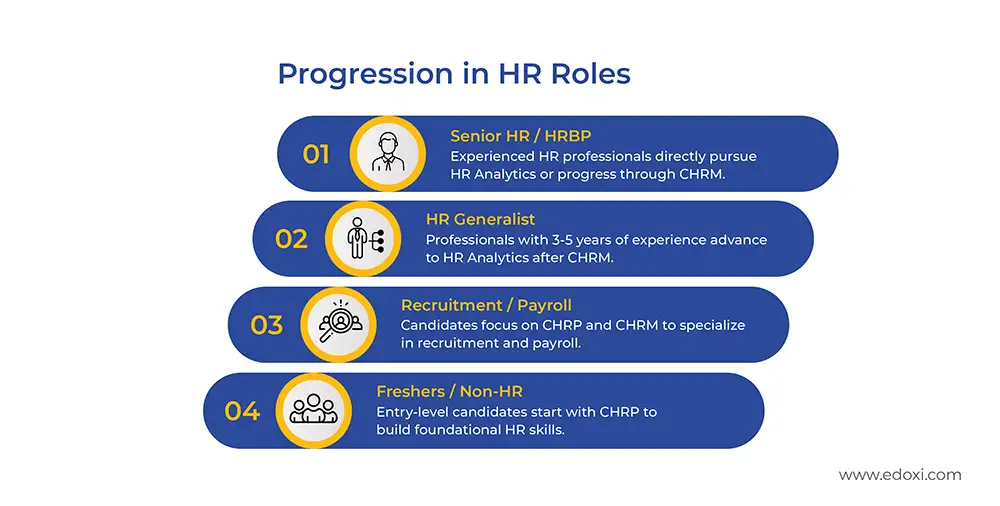Edoxi’s 30-hour online CHRM (Certified Human Resource Manager) course is designed to help HR professionals master strategic leadership and workforce management. The CHRM program focuses on strategic HR planning, talent acquisition, HR analytics, compliance, and employee engagement. This CHRM course builds advanced decision-making skills essential for HR leadership in today’s dynamic business landscape. CHRM training teaches you to plan, hire, engage, and develop talent using effective HR strategies, using modern technology. The course features hands-on tasks and case studies in HR analytics and labour laws. It also covers HR policies, recruitment, metrics, audits, scorecards, competencies, compensation, engagement, talent management, and the HRBP role.
Our CHRM program is ideal for professionals aiming to move from mid-level HR roles to strategic positions such as Senior HR or HR Business Partner. We equip you to implement data-driven HR solutions and leverage emerging technologies like AI-powered recruitment.
Throughout the CHRM course, you’ll master HR strategy, apply HR analytics, explore industry-specific case studies, join leadership discussions, and work on practical projects. Upon completing the course, you will earn a CPD UK Certificate from Edoxi and qualify for senior HR roles at top companies like Emirates and Marriott. Enrol now to gain in-demand skills and advance your career.

Engage in interactive sessions covering HR tools, workforce planning, and organizational development strategies.
Analyze real-world HR scenarios, applying data-driven solutions to workforce challenges across industries.
Master key HR metrics, performance indicators, and compensation analytics for strategic decision-making.
Participate in expert-led discussions on emerging HR trends, talent management, and compliance strategies.
Gain access to HR strategy guides, research reports, and regulatory frameworks to enhance HR expertise.
Apply learned concepts through hands-on projects in HR analytics, change management, and talent retention.
HR practitioners aiming to advance in workforce planning, talent strategy, and leadership roles.
Managers seeking expertise in human capital management, employee engagement, and team performance optimization.
Hiring professionals looking to master strategic workforce planning and competency-based hiring techniques.
Experts focusing on HR transformation, change management, and corporate restructuring strategies.
Business professionals moving into HR roles with strong analytical, leadership, and communication skills.
Industry-experienced professionals aiming to formalize HR expertise with globally recognized certification.
The CHRM course includes hands-on workshops in HR strategy, workforce analytics, and talent planning. Learn compensation modelling, predictive analytics, and data-driven decision-making. Key projects and studies include:
Create HR dashboards, analyze key workforce performance indicators, and benchmark compensation strategies.
Evaluate case studies on corporate restructuring, cultural transformation, and employee engagement initiatives.
Develop data-driven talent acquisition, succession planning, and workforce retention strategies.
CHRM training builds the strategic, analytical, and leadership skills needed to manage modern HR. Key CHRM Course outcomes include:

Get expert assistance in getting you CHRM Course customised!
Here’s a four-step guide to becoming a certified CHRM professional.
Join Edoxi’s CHRM Course
Among the various available possibilities, Edoxi stands out as the best pick. The following are the reasons why Edoxi's CHRM training is the best solution for you.
The curriculum incorporates HR analytics, digital transformation, and real-world applications to enhance strategic workforce planning.
Small batch sizes ensure focused learning, enabling participants to master advanced HR methodologies and leadership skills.
Gain access to HR strategy guides, workforce planning models, and project-based learning assessments for real-world implementation.
Strong corporate connections in Dubai provide valuable networking opportunities for HR professionals seeking leadership roles.
Available in classroom and online formats, the program is structured to accommodate working professionals without compromising learning quality.

Our mentors are leaders and experts in their fields. They can challenge and guide you on your road to success!

Khadiry Syed
Khadiry Syed is an accomplished HR Consultant and Corporate Trainer with over 8 years of experience across Human Resources, Learning & Development, and organisational training. He specialises in CHRP, HR Analytics, CIRP, UAE Labour Laws, HRIS Implementation and AIHR Modules. Syed’s expertise spans HR consulting, talent management, organisational development, learning & development strategy, recruitment and onboarding, coaching, career guidance, and skills development, supported by strong capabilities in business analysis, training content design, and workforce capability building. He holds a Master’s in International Business (France) and is professionally certified in CHRM, CHRP, and CILDP (London).CHRM Khadiry specialises in transforming complex HR concepts into practical, actionable frameworks that deliver measurable business outcomes. He has delivered 1,500+ hours of corporate training and facilitated 50+ university workshops, helping organisations redesign HR processes, strengthen leadership capability, and enhance employee performance. His engaging delivery style, strategic mindset, and transformation-focused approach have earned him strong recognition across corporate and academic platforms.
Here is the list of other major locations where Edoxi offers CHRM Course
CHRM graduates can secure roles like HR Coordinator, Employee Relations Specialist, HR Manager, and HR Director.
According to Glassdoor, CHRM-certified professionals in India earn an average base salary of around $285 per month. However, actual earnings can vary widely depending on industry demand, cost of living, and individual performance.
The program includes 30 hours of training in both classroom and online formats, with flexible scheduling for professionals.